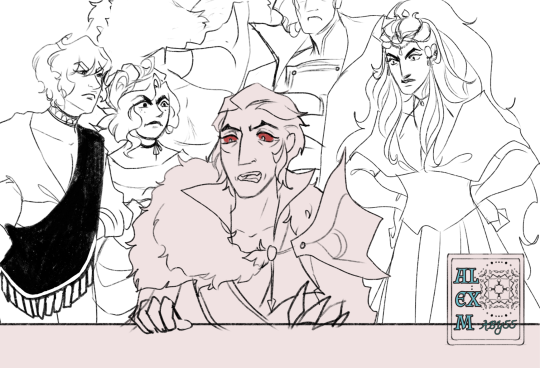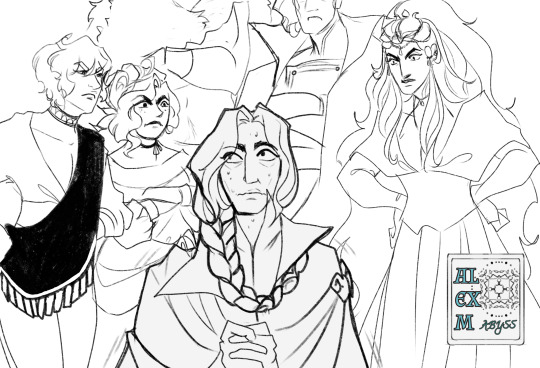#sadly my coloring patience is low so b&w only
Note
I'm sorry one more but draw either Lucio, the Devil, or Valerius like this:



Bonus:
I came out to have a good time, but I feel so attacked right now squad
@claudia-nomusaabara Your prompts are my rainy day stash prompts, thank you for sending this one in. It was a blast to do.


#asra alnazar#nadia satrinava#portia devorak#julian devorak#muriel of the kokhuri#count lucio#consul valerius#m6 the arcana#devil the arcana patron#arcana oc#sadly my coloring patience is low so b&w only#abyss request hours#v proud of nadias staring daggers face#and devils :U
174 notes
·
View notes
Text
wuxia/xianxia: a loose and somewhat second-hand introduction to the genre, pt1
Sorry for the unconventional q, but i keep seeing Grandmaster of Demonic Cultivation everywhere and I kinda want to get into it but a) don't know where to start (web series? live action adaptation?? wait how many are there!) and b) i don't really "get" wuxia / xianxia, that sorta stuff, i find it really hard to cross that cultural barrier and chinese mentality seems very alien. (it's not that i have no experience w different mentalities but chinese in particular is v hard to grasp w/o sources).
So if you have the time and patience, I'd love to hear a summary of it (like, a coherent summary bc all i get on the wikis is a shower of names and concepts that don't make sense to me) and perhaps some "intro for dummies" abt the relevant parts of chinese history and mentality tied to it? not just the cultivation / buddhist part but also re: familial relationships, philosophy and all that. (v brief and low effort of course) Thank you and sorry for bothering you!
("brief and low effort" referring to what I'm asking from you, not to what I need for me - as in i asked for it so i'm more than ready for a complicated essay, but you can write with as much detail as you like, I don't want to ask for some sort of comprehensive tome)
Okay first, you do realize that if you want “brief and low” for anything, you’re asking the wrong person? I was a philosophy major. brief got drilled out of me a long time ago.
Second... well, explaining what makes The Untamed / Grandmaster of Demonic Cultivation (mdzs for short, from the chinese title, Mo Dao Zu Shi) such a standout story does require understanding some of the wuxia conventions it subverts -- as well as some that it plays straight (so to speak) very, very well.
I figure the best approach (again, sadly not brief) is to first get a handle on the genre of wuxia. Gonna break this post into two, so you’re not reading in a single three-hour stretch or something. I’ll do a follow-up about mdzs, to hopefully make it a bit more accessible for you.
before I do that, let me first say: I didn’t grow up with this genre, so there’s going to be parts that I may miscast unintentionally. for an insider’s view, my go-to voices are @guzhuangheaven, @atthewaterside, @dramatic-gwynne, @the50-person and @drunkensword. if any of them are reading this and can point to more/other/better voices, please do.
I have three analogies -- like cultural doorways -- and like all analogies, they break down when you get into the finer details. In the broad strokes, though, they mostly work, and if nothing else, hopefully they’ll demonstrate that wuxia may be a chinese-specific version, but part of a storytelling tradition that’s nearly universal.
The three doorways are: the american wild west, the samurai era, and the british arthurian romances. And, in a tangential way, the regency period in the romance genre.
--- --- --- --- --- --- --- --- --- --- --- ---
The term ‘wuxia’ can be translated several ways, but I prefer ‘martial chivalry’. Most wuxia takes place in the jianghu, a harder term to unpack. Generally, though, ‘the jianghu’ has connotations not all that different from what americans mean when they reference the wild west.
More of a concept than a physical place, the jianghu (like the ‘wild’ west) exists beyond the reach of the law and/or civilization. It’s occupied by a diverse cast of farmers, merchants, beggars, and so on, but also by outlaws, gangs, hermits, pretty much all those who don’t like the suffocating nature of the civilized world, for whatever reason. It’s not a lawless place (except to outsiders); it does have laws, but those are only unto itself.
So, jianghu is a world to itself, for the most part -- which also makes it kind of timeless. Tang dynasty, Song dynasty, Ming dynasty, it could be any of them and all of them and none of them. Just as the heyday of the cowboys and the cattle drives was barely a decade long, a culture’s romanticized history stretches into lifetimes that exist separate from any date you could pin down on a calendar.
The average wuxia protagonist would fit in reasonably well as knight errants in an arthurian romance, with one important detail in difference: they’re rarely aristocrats. Wuxia protagonists are just as likely (if not more so) to be lower-born, whether the child of farmers, or servants, some common caste.
This is where wuxia diverges from the british and japanese traditions, which have a bit more noblesse oblige going on (knights and samurai both being upper-class types). Even ‘aristocratic’ characters tend to be so only within the jianghu -- sort of like the way a territory’s elected leader in the wild west would’ve had no pull in Washington, given they weren’t from a fully-recognized state.
Wuxia does often have politics, between competing sects (think schools of learning), but that political infighting is independent of the capital’s rules or wishes. A lot of stories -- in the rare cases the topic even comes up -- tends to speak of ‘the capital’ in disparaging terms.
That’s not to say wuxia is all about the flat social systems (it’s definitely not), but most commonly a rank implies some level of competence/study. The title of sect leader isn’t granted, it's earned. Children inherit, but it’s also a common storyline to have an heir with no skills (who then goes through all the trials and tribulations to finally level up and earn that position in turn).
What makes wuxia hard to grasp is its vernacular: the conventions that form the backbone that make something recognizably ‘wuxia’ and not just ‘historical drama set on a frontier in a loosely-defined time period’.
Frex: in a Wild West story, convention is two gunfighters at opposite ends of the street, and at least one of them is wearing a holster tied to his leg with string in a way that no real gunfighter wore, ever, but Hollywood came up with the idea and now it’s a permanent part of our imagination. In the arthurian romances, convention is carrying the token of one’s lady love (a distant, untouchable figure who rarely appears on-page), or meeting the unnamed knight in black on the jousting field. Convention are the samurai who’ll die for their lord’s honor, always touchy and prickly at the first sign of disrespect.
These are things granted the most remarkable gravity, that to an outsider might seem ridiculous. (Why is there always tumbleweed?)
Now, wuxia is the latest evolution in a long-lived literary tradition (and by ‘long’ I mean like 2000+ years) -- but like any living tradition, each subsequent generation reinvents it for their time. Part of that reinvention comes from particularly influential writers, who put their own spin on things, and their interpretation becomes the next generation’s standard for the genre -- “of course wuxia must have X” or “a protagonist never does Y”. (Like how Tolkien almost single-handedly changed western concepts of elves, in fiction.)
And here’s where I explain what regency romance has to do with it. Another short-lived period, in real history, but along came Georgette Heyer, who took bits and pieces of actual research, blended them with her reactionary politics, exaggerating some things and ignoring other things completely. The result is a time-that-never-was, but she cast (and still casts) a shadow so vast that I’ve seen multiple romance writers complain that readers will see a footnoted-and-researched version as wrong, if it contradicts one of Heyer’s made-up conventions.
Modern wuxia has its own Heyer-sized influencers -- like Jin Yong (the Condor trilogy, Demi-Gods and Semi-Devils), Wen Rui'an (The Four), Gu Long (The Legend of Flying Daggers, The Proud Twins), to name a few of the biggest. If you have a chance or are inclined, the big names get remade on a pretty regular basis, and catching one will at least let you see some ur-tropes in action.
But it also means that you can’t really extrapolate, in the sense of saying, “in wuxia, people do X, ergo, X is also a factor in Chinese culture.” It’s like... take any western made in the 50s, and the vernacular is simple. The bad guys wear black hats, the good guys wear white hats, the prostitutes wear bright-colored dresses with frills and the good women wear subdued colors buttoned up to their neck. It told an audience exactly what character filled what role, but that’d tell you zero about real people you might meet in Nebraska or Utah, let alone New York City.
--- --- --- --- --- --- --- --- --- --- --- ---
Almost forgot: xianxia is basically wuxia but with ‘immortal heroes’ -- so there’s gods, divine influences, non-human beings as characters (main or NPC), etc. (Btw, by ‘immortal’ I mean exactly that, like this character is six hundred years old, that one’s a thousand years old, etc.) You can think of xianxia as wuxia, but amped way up on the mystical scale.
Xianxia will sometimes take place on earth (jianghu) but sometimes in the celestial realm (heaven). Or a mix of both, like stories where a character falls (or is banished, or defects) from heaven and has to go through various trials and tribulations as a mortal human in order to regain a power, rise in rank, fall in love, or whatever their goal is.
A number of wuxia stories are driven by some sort of mcguffin, but in xianxia, the mcguffin is more likely to be a powerful spiritual weapon. But I can also think of a number of wuxia in which the mcguffin would fit right in, in xianxia (some near-mystical thing with significant positive, or negative, power independent of the wielder, which often amplifies or boosts the wielder to an inhuman degree, etc).
Thing is, the mcguffin being divine/infernal supernatural isn’t enough alone to make the story xianxia. I’m pretty sure you need non-human or super-human immortals and/or creatures to be considered in the xianxia genre.
part two
571 notes
·
View notes